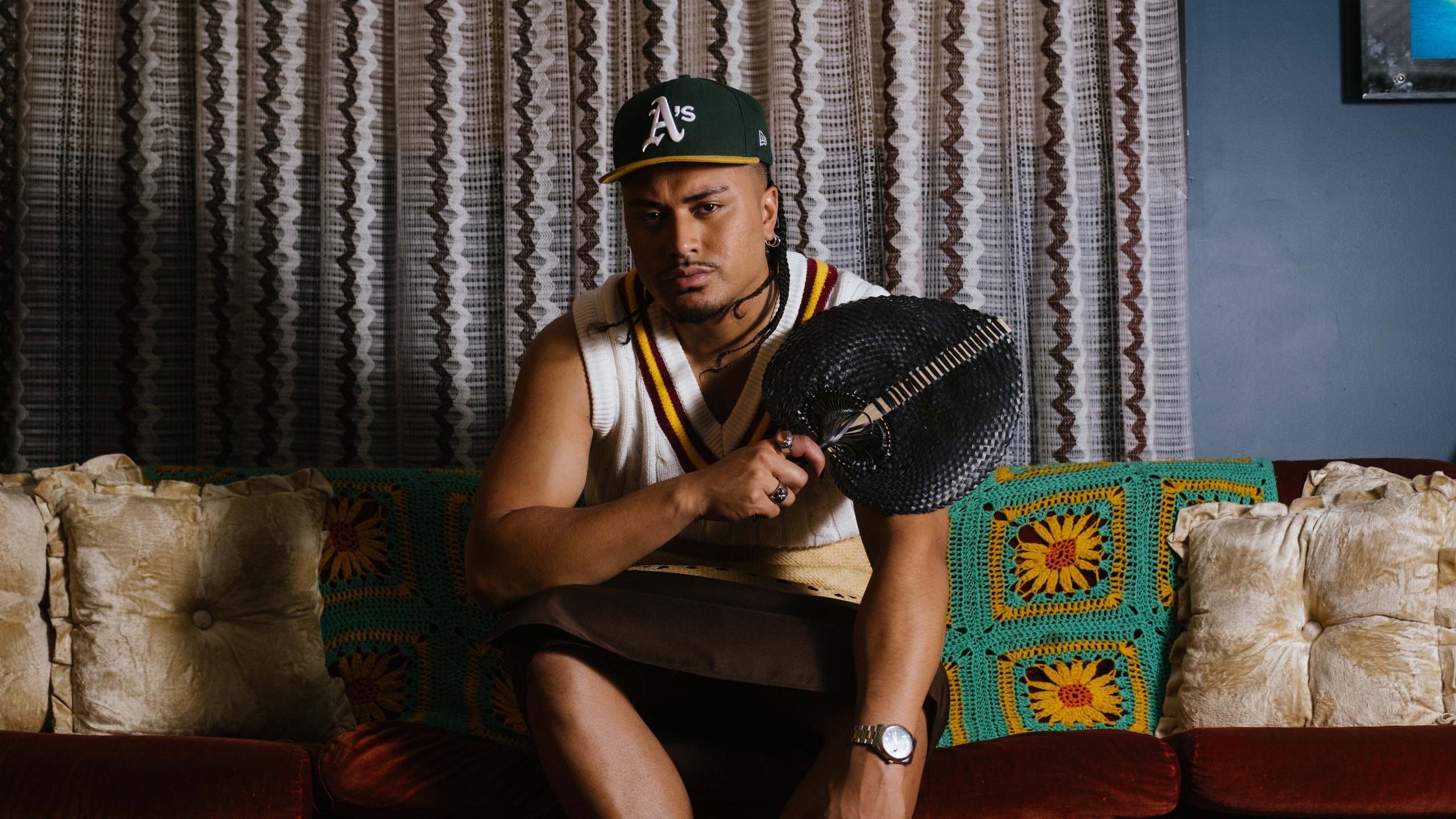
JP Foliaki on Reprising Maka in Red, White and Brass: The Play & Flying the Flag for Tonga
The Tongan star tells all about the family who shaped him, the art he’s making, and the culture he does it all for.
July 16, 2024

John-Paul “JP” Foliaki, the breakout Tongan star of Red, White and Brass, is doing it for the culture.
“Our ancestors told stories for thousands of years, and you know what the common theme is?” Foliaki asks, reprising his film role of Maka in the debut season of Red, White and Brass: The Play, which had its opening night on June 20 at the ASB Waterfront Theatre in Auckland, New Zealand. The answer, he reveals, is that “nobody tells us how to.”
Backstage in his dressing room, before stepping out to open the show, the 29-year-old actor is deep in thought. “I just want to make my country, my family and my friends — the people who have believed in me up to this point — proud,” Foliaki tells Teen Vogue. “Make that sacrifice worthwhile, worthy of the struggle, worth everything that people have poured into me.”
The play, adapted from the film by Leki Jackson-Bourke and inspired by true events from the 2011 Rugby World Cup, follows scrappy Tongan superfan Maka on his mission to score tickets to the Tonga v. France match, going so far as inventing a brass band to play as pre-game entertainment, in four weeks, with no experience.
At the play’s climax, channeling Maka, Foliaki says: “This is for those who came before us and those who will come after us.” It’s the one part of the show that cracks him open. Felt in that moment is everything that JP Foliaki knows about sacrifice, and the wisdom he’s still learning about when to fly the flag for Tonga, and when to let himself fly on his own.
Photographer: Geoffrey Matautia. Stylist: Frankie Lolohea. Stylist Assistant: Liffy Pani. Makeup Artist: Victoria Asi.
We first meet at rehearsal for the play in late May. From the jump, Foliaki treats me like a brother, one of his tokos from Southside. There’s little to discern him from Maka — a public nuisance, I point out. “That’s me. I’m the public nuisance. I get kicked out of bars,” he laughs.
“Golden child, great at everything, Prefect, 1st XV rugby team,” are descriptors of… Foliaki’s older brother. “And then I come along like, when can I go to the club?” he says. “Even though you have good leadership skills in class,” teachers would say, “we don’t know where you’re going to lead them.”
Foliaki has this tendency when he speaks; his voice hits a forte, his eyes grow, it’s borderline theatrical. He is the textbook definition of a yapper, but you want to listen. Simply put, he’s māfana. A word that no translation seems to do justice. “The state of being warm,” he explains. “The feeling in your heart when you see people that you relate to, people from your culture, people that you love, doing well.”
He’s a brown boy on his way to the global stage, 676 to the world, and it shows in the way he holds himself. With dignity, a thirst for excellence. But taking Maka to the stage has not been devoid of challenges. “I’m getting my ass kicked every day,” he says. “You learn the lines, then you forget the choreography; you learn the choreo, you forget the lines.” And he almost declined the role. Cast the role fresh, he’d thought, give someone younger, hungrier, the chance to originate Maka for the stage.
“I do love Tonga. I love everything about being Tongan, but I didn’t know if I could handle whatever’s gonna come my way from it.” It’s that vicious depletion of energy on show night, and then fronting up at the stage door for the community afterwards, that worried him. After several prayers, he took the role.
When the show starts on opening night, the Tongan pride is palpable. Backstage, the theatre stairwell is covered in autographs from productions past. This is the first Tongan show at the ASB Waterfront, and one imagines the stairwell will soon bear the cast’s surnames, names that have come from the Islands and taken root here in Aotearoa.
Foliaki deftly cuts through tension on stage, covering the place in his dazzling charisma. There’s even a bit where the cast reenact the birth of Christ with a retooled version of Shania Twain’s “From This Moment On.” And when the company unites to sing a Tongan hymn, it’s enough to rouse the ancestors, who are surely there.
At intermission, an older pālangi gentleman reaches over to me. He’s never seen the film, this is all new to him tonight. We talk about the significance of seeing brown faces in this space that hasn’t traditionally been accommodating, how we seem to be in a time of unprecedented division; how in this theatre, we’re celebrating the things we share in common. And he dotes on Foliaki, how truly magnificent he is.
“Tongans doing the most as always,” is how Foliaki describes the U.S. and Hawai’i tour of the Red, White and Brass film last September, when fans rocked up to cinemas with boomboxes, māfana on full display. He met O.C. legends Common Kings, American Idol winner Iam Tongi, and the Tongan Prime Minister; the mayor of San Bruno gave him a certificate in recognition of the film.
Fans also knew him from Inky Pinky Ponky, a film led by Amanaki Prescott-Faletau in the role of Lisa, a young fakaleitī navigating high school bigotry and her feelings for Foliaki’s 1st XV captain, Mose. The stage show of Inky Pinky Ponky was one of the first that Foliaki saw from Pacific creatives at Māngere Arts Centre. “It was so foreign to me, but I had this longing to be part of it,” he recalls. Now he’s being recognised for that story onscreen, worldwide.
He was hesitant to play Mose. “I had to be prepared to face any kind of backlash,” he says. Would he be ready to face criticism from his community, for acting in a story about a fakaleitī character? “Knowing how important that type of story is for people in the community, that’s more important to me than what anyone else could ever say.” Foliaki knows that ultimately, no one shoulders that burden more than fakaleitī in the real world.
“There’s this whole new generation coming up that is dying for content,” he says of Inky Pinky Ponky’s reception. “They want to see Pacific love stories, high school stories. They want to see themselves, so they ate it up, and they did their own renditions, TikTok trends, bombing me in the DMs — and I’m like, do you guys realize I’m almost thirty. I’m not a high school student.”
Despite the love he felt on tour, it was lonely. “I’m with my family from overseas,” Foliaki remembers, “but I’m not with my village that helped me.” Celebration hits different when it’s spent with those who shined your shoes and swept your path just so you could walk into your destiny. “I will have to learn, and the family back home will learn as well, that we will find our time to celebrate together, and it’ll make it all worth it.”
The way Maka rounds up the church to realize his vision is exactly how Foliaki calls on his village to create his projects. “They know I’m reeling them in to help me with some dream,” he says. “They might all sit there, roll their eyes and talk sh*t, but they’ll help me. They’re there.”
At the end of the day, this man is tired. He’s growing more reserved. People “want to see that high energy, that māfana, they want to see the guy that’s flying the flag. They don’t want a half-assed person that’s got low energy,” he says. “Tongans will be so generous with their love, and you want to reciprocate that, but the energy levels sometimes aren’t there, so it did take a lot out of me.” But he’s catching on: “You don’t have to always be the person to fly the flag — let someone else do it… Representation is so important, but not to the point where you lose yourself in the process.”





